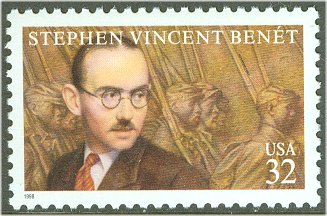There are many days in the year that we celebrate, but this one
is wholly of our earth. Three hundred and eighteen years ago,
long before we were ever a nation, a handful of men and women who
wished to live for an idea and were willing to die for it, first
set this day apart as a day of thanks. They were neither rich nor
powerful, those men and women of Plymouth; they had bought the
very ground they stood on by the deaths of their nearest and
dearest. After three years of toil and suffering, they had made a
small settlement and planted a few cleared fields. Behind them
lay the ocean; before them, the untamed forest. They had come a
long way to stand between sea and forest; they had left all ease
and security behind them. Even so, they could not know whether
their experiment in freedom would succeed or fail; they could not
even be sure that Plymouth Colony would live through the next
winter. It is hard for us to realize that; it was what they
faced, under all their courage. Nevertheless, cut off from all
they had known, alone beyond our knowledge, they gave thanks in
humble sincerity for God's mercies and the gift of corn.
Today, one hundred and thirty million Americans keep the day they
first set apart. We all know what Thanksgiving is--it's turkey
day and pumpkin pie day--the day of the meeting of friends and
the gathering of families. It does not belong to any one creed or
stock among us, it does not honor any one great man. It is the
whole family's day--the whole people's day--the day at the turn
of the year when we can all get together, think over the past
months a little, feel a sense of harvest, a kinship with our
land. It is one of the most secure and friendly of all our
feasts. And yet it was first founded in insecurity, by men who
stood up to danger. And that spirit is still alive.
This year it is and must be a sober feast. And yet, if we know
our hearts, as a people, we can be grateful--not in vainglory or
self-satisfaction, but for essential things. Let us speak out
some of the things that are in our hearts.
We are grateful to those before us who made this country and
fought for it, who hewed it out of the wilderness and sowed it
with the wheat of freedom. We are grateful to all Americans, of
all kinds and sorts and beliefs, who stood up on their hind legs
and protested against injustice, from the first plantings till
now. We are grateful to the great men, present and past, who have
risen from our earth to lead us, and to the innumerable many
whose names are not in the histories but without whose laughter
and courage, endurance and resolution, all our history would have
been in vain.
We are grateful for our land itself--not for its material
resources or the plenty of its fields--but for its vast diversity
under the great bond of union. We are grateful for Connecticut
elm and Georgia pine, for the big stars over Texas and the bread
of the Middle West. We are grateful to little towns with common
place names where people get along with each other, not because
they are told to, but just because they believe in getting along.
That's the way we like to have it, and mean to have it. We are
grateful because we believe that all those who would confuse and
divide us with counsels of class hatred, race hatred, despair and
defeat know little of the temper of our people. We are grateful
to all the others, to every good neighbor, to each man and woman
of good will.
We are grateful to those who guard the far-flung outposts of our
nation--to the men on the lonely sea patrols, on the high patrols
of the air. To the men in the camps, to the men on the ships, to
the men of the air, to all those who keep watch and guard, we pay
our tribute today. Nor can that tribute be paid in fine words
alone. These are our own men we have summoned--it is the business
of all of us to back them with the firm resolution of a united
nation. And that shall be done.
Most of all we are grateful, under God, for the spirit that walks
abroad in this land of ours--the spirit that has made us and kept
us free. It is many years indeed since men first came here for
freedom. The democracy we cherish is the work of many years and
many men. But as those first men and women first gave thanks, in
a dark hour, for the corn that meant life to them, so let us give
thanks today--not for the little things of the easy years but for
the land we cherish, the way of life we honor, and the freedom we
shall maintain.
From the book: We Stand United and other Radio Scripts [1940-1942]
Albie's note:
I like old Benet's thoughts in this radio address.
Thankfulness is vital to any nation of people.
Here's hoping you and yours have a great holiday!
PEACE.
"You say, 'If I had a little more, I should be very satisfied.'
You make a mistake. If you are not content with what you have,
you would not be satisfied if it were doubled."
--Charles Haddon Spurgeon


No comments:
Post a Comment